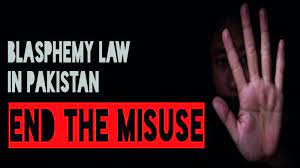Tabita Gill is a Christian woman who worked as a nurse in a State-run hospital in the port city of Karachi.
As per her daily routine, she was performing her duties in the hospital on January 28, 2021, when some people attacked her, slapping and kicking her. All this was filmed and the video clip went viral. Those who tortured Tabita Gill accused her of insulting their religious beliefs. Resultantly, a case was registered against her under Section 295(C)of the Pakistan Penal Code (PPC).
When Tabita Gill was being tortured, she repeatedly pleaded innocence, saying that she did not hurt anyone’s religion. But after the investigation, the allegations were proved to be false, which led to her release.
This is not the first case of a non-Muslim being subjected to torture on the charges of blasphemy. A number of such cases were reported in the past and the practice still goes unabated.
A similar incident took place in the district headquarters hospital in Faisalabad wherein two nurses were accused of blasphemy and locked up in the ward. An employee of the hospital attacked them with a knife. A few hours later, a case was registered against the nurses under Section 265(C ) in the Civil Lines Police Station on the complaint of the deputy superintendent of the hospital.
Peter Jacob, executive director of the Centre for Social Justice, says that the misuse of the blasphemy laws in Pakistan has become a serious concern “as thousands of people were charged with blasphemy in the past few years and a number of people lost their lives because of these accusations.” He adds that most of the accusations are motivated by personal enmity.
However, this matter is denied by the government, but in this regard, the Ministry of Interior says that the blasphemy laws are not being misused. If a person is accused of blasphemy, then a regular investigation is carried out and he is handed down punishment only if he is proven guilty.
Minority Rights Forum Spokesperson Shireen Aslam says that the blasphemy laws in Pakistan are designed to protect the sanctity of religious beliefs but at the same time, their misuse threatens the lives of innocent people.
A senior member of the Christian Journalist Association and human activist, Kashif Nawab, says that due to misuse of blasphemy laws not only makes the religious minorities suffer but also brings a bad name to Pakistan in the comity of nations.
“Most of the cases filed under the charge of blasphemy in Pakistan are struck down in the Supreme Court. Asia Masih’s case is one such case,” he elaborates.
Asia Bibi, a resident of Nankana district in central Punjab, was booked on charges of blasphemy and was released after she had to spend around eight years behind the bars. In 2018, the Supreme Court acquitted her and she was shifted to Canada due to security concerns.
The case of Salamat Masih and Manzoor Masih was also a reason for the infamy of Pakistan at the international level. Both of them were convicted by a trial court and were later acquitted by the Supreme Court. They also took asylum in Germany owing to the life threats.
There are dozens of such cases.
One of the most horrific incidents relates to a Srilankan citizen Priyantha Kumar who was burnt alive after being tortured by factory workers in a factory in Sialkot.
The current blasphemy laws in Pakistan were introduced during the reign of military dictator General Zia-ul-Haq. From 1980 to 1986, several amendments were made to these blasphemy laws. In 1982, another clause was incorporated in the law which envisaged capital punishment for the desecration of the Holy Qur’an.
Besides, through 295(B) and 295(C), blasphemy against the Holy Prophet (peace be upon him) was also made punishable by death or life imprisonment.
While in recent days, another bill regarding blasphemy has been passed on January 17, under which life imprisonment has been proposed for insulting the companions of the family of the Holy Prophet (peace be upon him).
Advocate Riaz Bhatti says that at the time of drafting the blasphemy laws, it was ensured that those who commit blasphemy would be severely punished, but it did not specify the punishment for the false accuser.
No government department is ready to talk about how many of the blasphemy cases have been proven true and how many were filed out of personal enmity. Through the Right to Information Act, efforts have been made to get information from the Ministry of Interior, Ministry of Human Rights, Police Department, and other relevant departments, but no one has provided information, even the Ministry of Interior did not bother to pay any heed to it.
How many people named in blasphemy cases have gone abroad for their protection after being released? Unfortunately, this issue is not discussed, which is why it remains difficult to prevent those who abuse these laws.
Leader of Pakistan People’s Party and member of the National Assembly, Naveed Amir Jeeva, says that the biggest obstacle in addressing the misuse of blasphemy is political instability.
Former provincial minister of human rights and minority affairs, Ijaz Alam Augustine, says that preventing the misuse of blasphemy laws is very important for the integrity of the country. “All political parties and parliamentarians should think about it so that this problem can be solved.”
In order to prevent misuse of blasphemy laws, it was proposed during the regime of General Musharraf that blasphemy cases should be investigated by an SSP level officer, after which the Deputy Commissioner of the concerned district, if evidence of the crime is found the case would be filed, but with the permission of the deputy commissioner concerned. The proposal was welcomed by the minority groups, but due to pressure from religious parties, it could not be implemented.
MINORITIESMINORITIESINPAKISTANTHEWHITEPOST


